
A duchy, also called a dukedom, is a medieval country, territory, fief, or domain ruled by a duke or duchess, a ruler hierarchically second to the king or queen in Western European tradition.

Margaret Astrid Lindholm Ogden, known by her pen names Robin Hobb and Megan Lindholm, is an American writer of speculative fiction. As Hobb, she is best known for her fantasy novels set in the Realm of the Elderlings, which comprise the Farseer, Liveship Traders and Tawny Man trilogies, the Rain Wild chronicles, and the Fitz and the Fool trilogy. Lindholm's writing includes the urban fantasy novel Wizard of the Pigeons and science fiction short stories, among other works. As of 2018, her fiction has been translated into 22 languages and sold more than 4 million copies.

Assassin's Apprentice is a fantasy novel by American writer Robin Hobb, the first book in The Farseer Trilogy. It was Margaret Astrid Lindholm Ogden's first book under this pseudonym, and was published in 1995. The book was written under the working title Chivalry’s Bastard.

Assassin's Quest is a 1997 fantasy novel by American writer Robin Hobb, the third and final book in The Farseer Trilogy. It follows the exploits of FitzChivalry Farseer. While Fitz's narrative continues in The Tawny Man Trilogy, the Liveship Traders Trilogy is next in the chronology of the Realm of the Elderlings.

William King, also known as Bill King, is a Scottish writer of a number of science fiction and fantasy books, most notably in Games Workshop's Warhammer and Warhammer 40,000 series, published by Games Workshop's fiction arm Black Library.

Fool's Errand is a fantasy novel by American writer Robin Hobb, the first in her Tawny Man Trilogy. It commences 15 years after the events in Assassin's Quest, a period covered by The Liveship Traders Trilogy ; it resumes the story of FitzChivalry Farseer after he has wandered the world and finally settled to a quiet, cottage-dwelling life with his adopted son Hap.

The Golden Fool is a fantasy novel by American writer Robin Hobb, the second in her Tawny Man Trilogy. It was published in 2002.

Fool's Fate is a fantasy novel by American writer Robin Hobb, the third in her Tawny Man Trilogy. It was published in 2003.

The Farseer trilogy is a series of fantasy novels by American author Robin Hobb, published from 1995 to 1997. It is often described as epic fantasy, and as a character-driven and introspective work. Set in and around the fictional realm of the Six Duchies, it tells the story of FitzChivalry Farseer, an illegitimate son of a prince who is trained as an assassin. Political machinations within the royal family threaten his life, and the kingdom is beset by naval raids. Fitz possesses two forms of magic: the telepathic Skill that runs in the royal line, and the socially despised Wit that enables bonding with animals. The series follows his life as he seeks to restore stability to the kingdom.
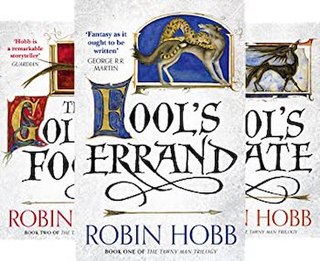
The Tawny Man trilogy is a series of novels by American author Robin Hobb, and the third trilogy in the Realm of the Elderlings sequence. Narrated in first person by FitzChivalry Farseer, it follows his life in his mid-thirties, and is set after the events of the Farseer Trilogy and the Liveship Traders.
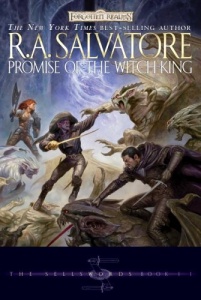
Promise of the Witch-King is book 2 of the Forgotten Realms trilogy The Sellswords. Book 1 was originally part of the Drizzt line of novels and has now been re-released with some short stories making up for the gap in time.

The Soldier Son trilogy is a fantasy novel series by Robin Hobb. Set in a new world unrelated to her previous trilogies, the Soldier Son trilogy follows the life of Nevare Burvelle, the second son of a newly elevated Lord of the Kingdom of Gernia.

King Kelson's Bride is a historical fantasy novel by American-born author Katherine Kurtz. It was first published by Ace Books in 2000. It was the thirteenth of Kurtz' Deryni novels to be published, and the only novel in the series that was not part of a trilogy. In terms of the series' internal literary chronology, King Kelson's Bride directly follows the events of the third Deryni trilogy, the Histories of King Kelson. The next trilogy to be published, the Childe Morgan series, is a direct prequel to the first Deryni series, the Chronicles of the Deryni.
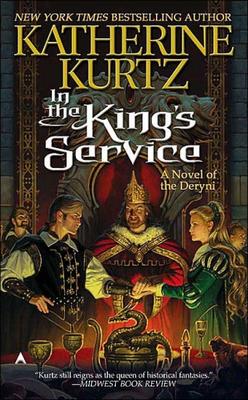
In the King's Service is a historical fantasy novel by American-born author Katherine Kurtz. It was first published by Ace Books in 2003. It was the fourteenth of Kurtz' Deryni novels to be published, and the first book in the fifth Deryni trilogy, the Childe Morgan trilogy. The events of this trilogy are a direct prequel to the first Deryni trilogy, the Chronicles of the Deryni.
Fitz was a patronymic indicator used in Anglo-Norman England to help distinguish individuals by identifying their immediate predecessors. Meaning "son of", it would precede the father's forename, or less commonly a title held by the father. In rare cases, it formed part of a matronymic to associate the bearer with a more prominent mother. Convention among modern historians is to represent the word as fitz, but in the original Norman French documentation, it appears as fiz, filz, or similar forms, deriving from the Old French noun filz, fiz, meaning "son of", and ultimately from Latin filius (son). Its use during the period of English surname adoption led to its incorporation into patronymic surnames, and at later periods this form was adopted by English kings for the surnames given some of their recognized illegitimate children, and by Irish families when anglicizing their Gaelic patronymic surnames.

The Liveship Traders is a trilogy of fantasy novels by American author Robin Hobb. A nautical fantasy series, the Liveship Traders is the second trilogy set in the Realm of the Elderlings and features pirates, sea serpents, a family of traders and their living ships. Several critics regard it as Hobb's best work.
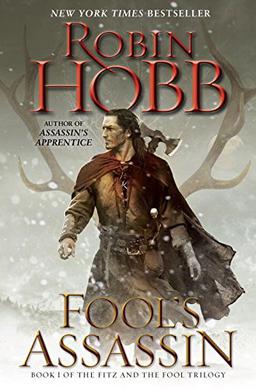
Fool's Assassin is the first book in the epic fantasy trilogy Fitz and the Fool, written by American author Robin Hobb. Ten years after the events of Fool's Fate, it resumes the story of FitzChivalry Farseer, a former assassin, as a middle-aged husband and father whose quiet life is disrupted by a new crisis.

Fool's Quest is the second book in the epic fantasy trilogy Fitz and the Fool, written by American author Robin Hobb. It was published by HarperCollins and released in August, 2015 and continues the story of FitzChivalry Farseer and his daughter Bee after the events of Fool's Assassin, published in 2014.
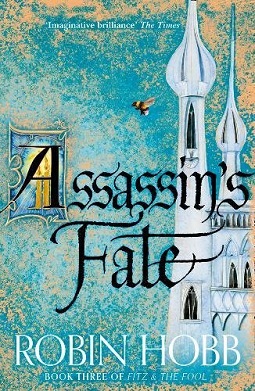
Assassin's Fate is the third book in the epic fantasy trilogy Fitz and the Fool, written by American author Robin Hobb. It continues the story of FitzChivalry Farseer and his daughter Bee after the events of Fool's Quest, published in 2015.

The Fitz and the Fool trilogy is the concluding subseries of the Realm of the Elderlings, a 16-book fantasy series by American author Robin Hobb. Published from 2014 to 2017, it features the protagonist FitzChivalry Farseer in his fifties, and follows his life with his wife Molly and daughter Bee Farseer. It was well-received by critics, with the Los Angeles Review of Books praising Hobb's characterization and portrayal of aging, and The Guardian positively viewing how the final book consolidated plot threads from across the series.



















